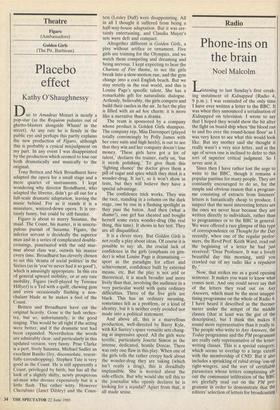Theatre
Figaro (Ambassadors) Golden Girls (The Pit, Barbican)
Placebo effect
Kathy O'Shaughnessy
Due to Amadeus Mozart is nearly a pop-star (as the Requiem pulsates out of
ghetto-blasters alongside Wham! in the street). At any rate he is firmly in the public eye and perhaps this partly explains
the new production of Figaro, although
this is probably a cynical misjudgment on my part. In any event I was disappointed by the production which seemed to lose out both dramatically and musically to the original.
Tony Britten and Nick Broadhurst have adapted the opera for a small stage and a mere quartet of instruments. I kept wondering why director Broadhurst, who adapted the libretto, didn't go all out for a full-scale dramatic adaptation, leaving the music behind. For as it stands it is a miniature, watered-down opera. It is cer- tainly funny, but could be still funnier.
Figaro is about to marry Susanna, the maid. The Count, his master, is in unscru- pulous pursuit of Susanna. Figaro, the inferior servant is decidedly the superior man and in a series of complicated double- crossings, punctuated with the odd mur- mur about class war, outwits his master every time. Broadhurst has cleverly chosen to set this 'drama of social politics' in the Sixties (as in `you've never had it so good'), which is amusingly appropriate. In this era of general upward mobility, or at any rate mobility, Figaro (well-played by Terence Hillyer) is a Ted with a quiff, chewing gum and even occasionally flashing a non- chalant blade as he makes a fool of the Count.
Britten and Broadhurst have cut the original heavily. Gone is the lush orches- tra, but so, unfortunately, is the good singing. This would be all right if the acting were better, and if the dramatic text had been expanded. Nevertheless the words are admirably clear, and particularly in this updated version, very funny. Prue Clarke is a pert, lively Susanna, Michael Sadler an excellent Basilio (fey, disconsolate, resent- fully eavesdropping). Stephen Tate is very good as the Count. He is still apparently a Count, privileged by birth, but has all the look of a slightly shifty, newly prosperous ad-man who dresses expensively but is a little flash. This rather witty. However Cherubino (Janet Dibley) and the Coun-
tess (Lesley Duff) were disappointing. All in all I thought it suffered from being a half-way-house adaptation. But it was cer- tainly entertaining, and Claudia Mayer's sets were deft and compact.
Altogether different is Golden Girls, a play without artifice or ornament. Five girls are training for the Olympics, and we
watch them competing and dreaming and being nervous. I kept expecting to hear the
Chariots of Fire theme, to see the girls
break into a slow-motion run, and the gym change into a cool English beach. But we stay strictly in the real world, and this is Louise Page's specific talent. She has a remarkable gift for naturalistic dialogue.
Artlessly, believably, the girls compete and build their castles in the air. In fact the play is filled with an ad hoc charm: it is more like a narrative than a drama.
The team is sponsored by a company whose product is Golden Girls shampoo.
The company rep, Miss Davenport (played totally convincingly by Polly James with her exec suits and high heels), is out to see that they win and her company doesn't lose money. 'These girls have got a lot of talent,' declares the trainer, early on, 'but it needs polishing.' To give them this `fighting chance' the doctor gives them a
pill of sugar and spice which they think is a wonder-drug. It isn't, so it won't show in tests, but they will believe they have a special advantage.
The confidence trick works. They win the race, standing in a column on the dark stage, one by one in a flashing spotlight as they pass the baton. And then (what a shame!), one girl has cheated and bought herself some extra wonder-drug (the real thing, this time). It shows in her test. They are all disqualified.
It is a clever story. But Golden Girls is not really a play about ideas. Of course it is
possible to say: ah, the crucial lack of confidence in the girls (emphasis on gen- der) is what Louise Page is dramatising - sport as the paradigm for effort and achievement, confidence built by external means, etc. But the play is not arid or theoretical, it is much broader and more lively than that, involving the audience in a very particular world with quite ordinary difficulties. Three of the five girls are black. This has an ordinary meaning, sometimes felt as a problem, or a kind of identity, but it is neither coyly avoided nor made into a political statement.
And above all, this is a marvellous production, well-directed by Barry Kyle, with Kit Surrey's spare versatile sets chang- ing at impressive speed. All the girls were terrific, particularly Josette Simon as the intense, dedicated, hostile Dorcas. There was only one flaw in this play. When one of the girls tells the rather creepy hack about the wonder-drug they are taking (which isn't really a drug), this is dreadfully implausible. She is worried about the side-effects. But why would she tell this to the journalist who openly declares he is looking for a scandal? Apart from that, it all made sense.














































 Previous page
Previous page